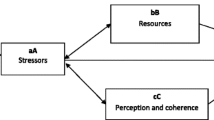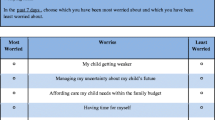Abstract
Care guidelines for Duchenne/Becker muscular dystrophy (DBMD) include recommendations for assessment of caregivers of patients with DBMD followed by proactive psychosocial interventions. To inform clinical assessment, this study described appraisals of psychosocial needs and caregiving facilitators of mothers of individuals with DBMD. Two hundred and five mothers completed an online survey. More than 50% endorsed unmet needs for managing uncertainty about the future and managing DBMD fears. Higher levels of unmet need were associated with less disease progression/earlier stage of DBMD (rho = −0.166 p = 0.02). Twenty-one percent regularly used respite care and 57% worried about allowing others to care for their child. Highly-endorsed care facilitators included partner relationships (63%), child’s approach to life (59%), and family relationships (49%). Our findings highlight the importance of psychological and social support for caregivers. Starting when children are young, clinicians should assess caregivers’ unmet psychological needs, particularly uncertainty and fear. Exploring needs and facilitators may allow clinics to target and customize interventions that build upon existing strengths and supports. Our findings have implications for efforts to promote early diagnosis and newborn screening, in that increased needs in mothers of younger children should be anticipated and built into counseling. Further research can assess whether and how unmet needs change as new therapies become available.
Similar content being viewed by others
References
Bonevski, B., Sanson-Fisher, A., Girgis, A., Burton, L., Cook, P., & Boyes, A. (2000). Evaluation of an instrument to assess the needs of patients with cancer, the supportive care review group. Cancer, 88, 217–225.
Boyer, F., Dramr, M., Morrone, I., & Novella, J. L. (2006). Factors relating to care burden for families of persons with muscular dystrophy. Journal of Rehabilitation Medicine, 38(5), 309–315.
Brandon. (2007). Time away from “smelling the roses”: where do mothers raising children with disabilities find the time to work? Social Science and Medicine, 65, 667–679.
Bushby, K., Finkel, R., Birn’krant, D. J., Case, L. E., Clemens, P. R., Cripe, L., Kaul, A., et al. (2010). Diagnosis and management of Duchenne muscular dystrophy: part 1: diagnosis, and pharmacological and psychosocial management. The Lancet. Neurology, 9, 77–93.
Chen, A. Y., & Newacheck, P. W. (2006). Insurance coverage and financial burden for families of children with special health care needs. Ambulatory Pediatrics, 6, 204–209.
Cohen, M. S. (1999). Families coping with childhood chronic illness: A research review. Families, Systems & Health, 17, 149–164.
Daoud, A., Dooley, J. M., & Gordon, K. E. (2004). Depression in parents of children with Duchenne muscular dystrophy. Pediatric Neurology, 31(1), 16–19.
Farmer, J. E., Marien, W. E., Clark, M. J., Sherman, A., & Selva, T. J. (2004). Primary care supports for children with chronic health conditions: identifying and predicting unmet family needs. Journal of Pediatric Psychology, 29(5), 355–367.
Flanigan, K. M. (2014). Duchenne and Becker muscular dystrophies. Neurologic Clinics, 32(3), 671–688.
Hatzmann, J., Heymans, H. S., Fefer-i-Carbonell, van Praag, B. M., & Grootenhuis, M. A. (2008). Hidden consequences of success in pediatrics: parental health-related quality of life-results from the Care Project. Pediatrics, 122(5), e1030–e1038.
Kenneson, A., & Bobo, J. K. (2010). The effect of caregiving on women in families with Duchenne/Becker muscular dystrophy. Health & Social Care in the Community, 18(5), 520–528.
King, S., Teplicky, R., King, G., & Rosenbaum, P. (2004). Family-centered service for children with cerebral palsy and their families: a review of the literature. Seminars in Pediatric Neurology, 11(1), 78–86.
Kinnett, K., Eakes, G. G., & Cripe, L. (2010). Duchenne muscular dystrophy: assessing patient and maternal needs, Advance Health Network. Available from: http://nurse-practitioners-and-physician-assistants.advanceweb.com/features/articles/duchenne-muscular-dystrophy.aspx. Accessed 15 Dec 2014.
Kirk, S. (1998). Families’ experiences of caring at home for a technology-dependent child: a review of the literature. Child: Care, Health and Development, 24, 101–114.
Kuhlthau, K., Hill, K. S., Yucel, R., & Perrin, J. M. (2005). Financial burden for families of children with special health care needs. Maternal and Child Health Journal, 9, 207–218.
Landfeldt, E., Lindgren, P., Bell, C. F., Schmitt, C., Guglieri, M., Straub, V., et al. (2014). The burden of Duchenne muscular dystrophy: An international, cross-sectional study. Neurology, 83(6), 529–536.
Landfeldt, E., Lindgren, P., Bell, C. F., Guglieri, M., Straub, V., Lochmuller, H., et al. (2016). Quantifying the burden of caregiving in Duchenne muscular dystrophy. Journal of Neurology, 263(5), 906–915. doi:10.1007/s00415-016-8080-9.
Levenson, D. (2012). Newborn screening for Duchenne muscular dystrophy gains support: researchers to push for federal recommendation to have states add DMD test to newborn panel. American Journal of Medical Genetics. Part A, 158A(12), viii–viix. doi:10.1002/ajmg.a.35799.
Lorio, J. G., Peay, H. L., & Mathews, K. D. (2015). Recognition and management of motor delay and muscle weakness in children. American Family Physician, 91(1), 38–44.
Magliano, L., D’Angelo, M. G., Vita, G., Pane, M., D’Amico, A., Balottin, U., et al. (2014). Psychological and practical difficulties among parents and healthy siblings of children with Duchenne vs. Becker muscular dystrophy: an Italian comparative study. Acta Myol, 33(3), 136–143.
Magliano, L., Patalano, M., Sagliocchi, A., Scutifero, M., Zaccaro, A., D’angelo, M. G., et al. (2015). Burden, professional support, and social network in families of children and young adults with muscular dystrophies. Muscle and Nerve, 52(1), 13–21.
Noritz, G. H., & Murphy, N. A. (2013). Neuromotor screening expert panel. Pediatrics, 131(6), e2016–e2027. doi:10.1542/peds.2013-1056.
Noss, A. (2012). American Community Survey Briefs. [Internet] U.S. Census Bureau. Available from: http://www.census.gov/prod/2013pubs/acsbr12-02.pdf. Accessed 16 Dec 2014.
Pangalila, R. F., van den Bos, G. A., Stam, H. J., van Exel, N. J., Brouwer, W. B., & Roebroeck, M. E. (2012). Subjective caregiver burden of parents of adults with Duchenne muscular dystrophy. Disability and Rehabilitation, 34(12), 988–996.
Peay, H. L., Hollin, I. L., & Bridges, J. F. (2016a). Prioritizing parental worry associated with Duchenne muscular dystrophy using best-worst scaling. Journal of Genetic Counseling, 25, 305–313.
Peay, H. L., Meiser, B., Kinnett, K., Furlong, P., Porter, K., & Tibben, A. (2016b). Mothers’ psychological adaptation to Duchenne/Becker muscular dystrophy. European Journal of Human Genetics, 24(5), 633–637.
Pelchat, D., Lefebvre, H., & Levert, M. J. (2007). Gender differences and similarities in the experience of parenting a child with a health problem: current state of knowledge. Journal of Child Health Care, 11, 112–131.
Robertson, J., Hatton, C., Wells, E., Collins, M., Langer, S., Welch, V., & Emerson, E. (2011). The impacts of short break provision on families with a disabled child: an international literature review. Health & Social Care in the Community, 19(4), 337–371.
Silver, E. J., Westbrok, L. E., & Stein, R. E. K. (1998). Relationship of parental psychological distress to consequences of chronic health conditions in children. Journal of Pediatric Psychology, 23, 5–15.
Thewes, B., Meiser, B., Tucker, M., & Tucker, K. (2003). The unmet information and support needs of women with a family history of breast cancer: a descriptive survey. Journal of Genetic Counseling, 12(1), 61–76.
Thompson Jr., R. J., Gil, K. M., Gustafson, K. E., George, L. K., Keith, B. R., Spick, A., & Kinney, T. R. (1994). Stability and change in the psychological adjustment of mothers of children and adolescents with cystic fibrosis and sickle cell disease. Journal of Pediatric Psychology, 19(2), 171–188.
Thyen, U., Kuhltau, K., & Perrin, J. M. (1999). Employment, child care, and mental health of mothers caring for children assisted by technology. Pediatrics, 103, 1235–1242.
Wallander, J. L., & Varni, J. W. (1998). Effects of pediatric chronic physical disorders on child and family adjustment. Journal of Child Psychology and Psychiatry, and Allied Disciplines, 39, 29–46.
Webb, C. L. (2005). Parents’ perspectives on coping with Duchenne muscular dystrophy. Child: Care, Health and Development, 31(4), 385–396.
Acknowledgements
We are very grateful to the mothers who participated in this study. Holly Peay and Kathleen Kinnett are supported through an award from the Patient-Centered Outcomes Research Institute (PCORI) PCORnet Program (PPRN-1306-04640-Phase II). Bettina Meiser received a Career Development Award Level 2 from the NHMRC. Parent Project Muscular Dystrophy supported this research.
Author information
Authors and Affiliations
Corresponding author
Ethics declarations
Conflict of Interest
Holly L Peay, Bettina Meiser, Kathleen Kinnett and Aad Tibben declare that they have no conflict of interest.
Human Studies and Informed Consent
All procedures followed were in accordance with the ethical standards of the responsible committee on human experimentation (institutional and national) and with the Helsinki Declaration of 1975, as revised in 2000 (5). This study was determined to be exempt by the Cincinnati Children’s Hospital Medical Center Institutional Review Board.
Animal Studies
No animal studies were carried out by the authors for this article.
Rights and permissions
About this article
Cite this article
Peay, H.L., Meiser, B., Kinnett, K. et al. Psychosocial Needs and Facilitators of Mothers Caring for Children with Duchenne/Becker Muscular Dystrophy. J Genet Counsel 27, 197–203 (2018). https://doi.org/10.1007/s10897-017-0141-4
Received:
Accepted:
Published:
Issue Date:
DOI: https://doi.org/10.1007/s10897-017-0141-4




